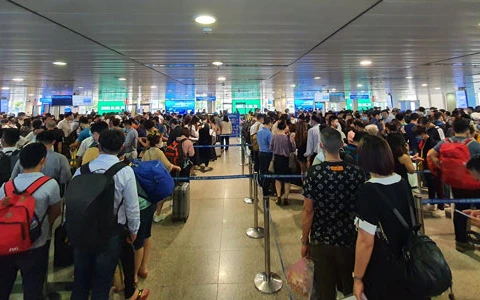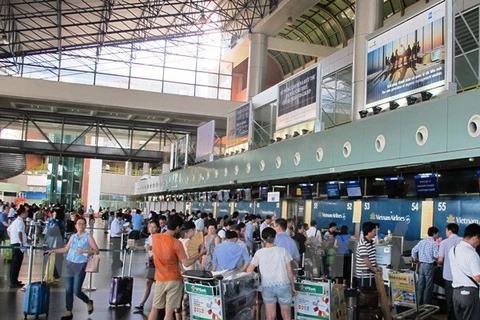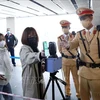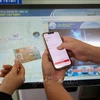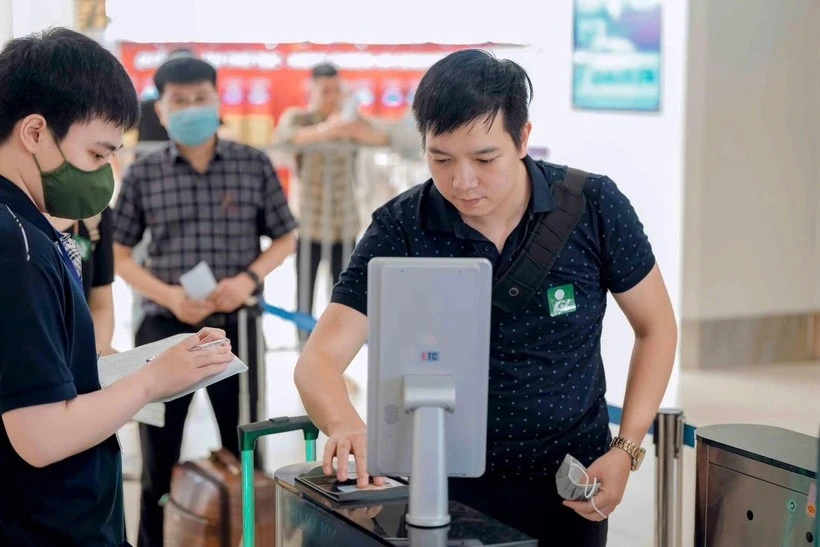
Hanoi (VNA) - Vietnam's aviation industry is embracing the digital transformation revolution to modernise airport operations and enhance passenger experiences. The launch of the "One ID" system, a digital identification platform, marks a crucial step in streamlining airport processes, reducing congestion, and improving overall efficiency.

At a recent workshop on "One ID: Enhancing Airport Processes", organised by the Airports Corporation of Vietnam (ACV) in collaboration with the International Air Transport Association (IATA), Do Hong Cam, Deputy Director of the Civil Aviation Authority of Vietnam, underscored the critical need for digital integration in the aviation sector.
He highlighted that the Ministry of Transport’s digital transformation initiative aims to modernise the industry, align it with global standards, and ensure the security and sustainability of Vietnam’s aviation infrastructure.
Cam emphasised the urgency of this transformation, referencing IATA's projection that the aviation industry will double in size by 2041. The One ID system, which leverages biometric identification and digital platforms, is designed to ease the burden on airport infrastructure, lower operational costs, and enhance service quality. These improvements are expected to result in reduced airfares and increased profitability for airlines.
Vinoop Goel, IATA’s Regional Director for Airports and External Relations in Asia-Pacific, noted that many airports are operating at or beyond capacity, with limited possibilities for expansion due to land and investment constraints. Traditional airport procedures like check-in and boarding have seen minimal innovation over the years, leading to prolonged wait times for passengers. One ID seeks to address these inefficiencies by digitising and simplifying the entire travel process.
Shu Hui Bian, IATA’s Director of Passenger Experience, Safety, and Security in Asia-Pacific, explained that One ID facilitates a contactless, paperless journey for passengers. By storing biometric data in digital wallets, travellers can bypass conventional document checks and move through airports more quickly, similar to the convenience of mobile payment systems.

Huynh Bao Quoc, head of IT at ACV, revealed plans to roll out the ACV ID system at Phu Bai and Dien Bien airports, with a broader national expansion to follow. This system will use Vietnam’s national population database to verify passenger identities through biometric recognition, thereby streamlining security checks and reducing wait times.
In addition, ACV is set to launch a mobile app, ACV ID, enabling passengers to manage their travel details, including flight information and airport services, directly from their smartphones. The app is expected to be available by the end of this year or early next year.
Despite the clear benefits, the implementation of One ID presents several challenges. Deputy Director Do Hong Cam acknowledged that significant investments in hardware, software, and personnel training are necessary, requiring a careful balance of costs and economic benefits. Furthermore, concerns regarding cybersecurity, data protection, and international data-sharing agreements must be thoroughly addressed to ensure the system's success.

Do Xuan Toan, deputy head of security at ACV, stressed the importance of protecting personal data while enabling efficient data sharing between domestic and international stakeholders. He called on the government and aviation authorities to establish regulations that align with international standards, facilitating the secure and effective use of biometric and digital identification systems.
Vietnam’s adoption of One ID signals a major advancement towards a more efficient, secure, and passenger-friendly aviation industry. As the country continues to integrate digital technology into its transport infrastructure, the success of these initiatives will rely on strong collaboration between government agencies, airlines, and international partners./.

